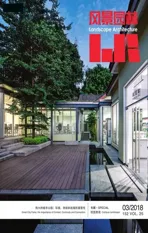以色列卡如也特 · 比利克绿色小学—如卡弗特学校校园设计
2018-06-29奥纳本棕纳比瑞本沙巴BOLandscape事务所
奥纳·本棕纳 比瑞·本沙巴(BO-Landscape事务所)
在学年伊始、如卡弗特学校(Rakafot School)建设完工的2周后,作为这个学校的风景园林设计师,我们接到了一个意外的电话。“我想听听你们对于在学校‘冬日池塘’放养青蛙的意见。”来电话的是我们的农学老师,“我们听到了学生们对于蚊子的抱怨,因此我想,用青蛙来治理这些蚊子似乎是个不错的主意,而且青蛙的呱呱声伴随着孩子们的欢声笑语将会听起来很美妙。 ” “这听起来不错,”我们都非常认同这个想法,于是迫不及待地答应了她“这个方法一定会有效!”
我们的设计是为全校师生提供可以用来感知、观察、发现、了解环境,并有助于创建一个丰富而不断变化的生态系统的平台。
这里的“池塘”其实指的是一处洼地,自新学年开始时下的一场大雨过后,这里就汇集了周围的雨水形成了池塘。池塘里不仅汇聚了充沛的水,也逐渐生长出多种动植物。因此,这个蓄水池塘除了作为一个景观装饰元素外,还将收集到的雨水径流用于花园灌溉。而这个过程也为学生们提供了一节生动的实践课,让他们有机会去观察在丰富的生长环境中不同生物的生存模式。
“冬日池塘”只是卡如也特·比利克的如卡弗特小学校园绿色建设理念中的其中一个例子。这座拥有18个教室的小学是以色列环境部的一个试点项目,是未来生态导向型学校的一个先例。这类学校也具有多方面的附加价值,包括提升环境意识、促进环境保护、有效利用资源、提供最佳学习条件和环境教育。

1 场地平面图Site plan
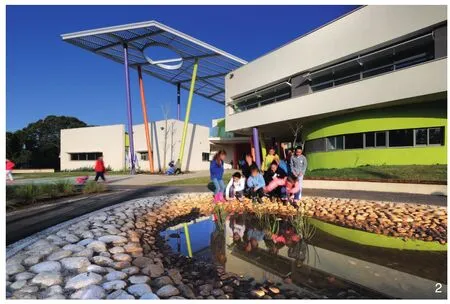
2 冬日池塘The winter pond

3 室外教室The outdoor classroom
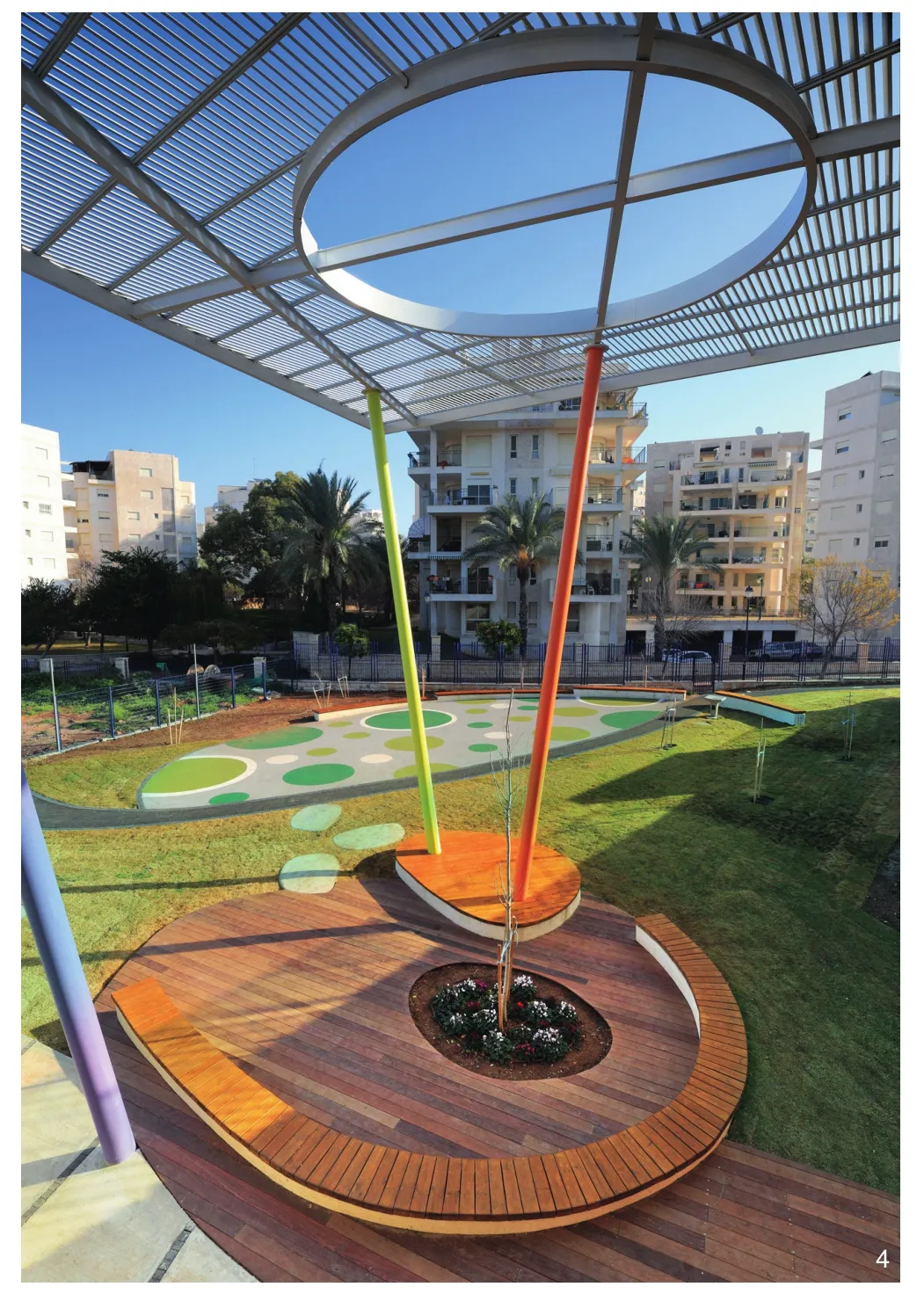
4 圆凳The round bench
为了提高学校场地规划中的绿色建造标准,我们建造了可以让雨水渗入土壤的区域和利用藤蔓植物、节水植物来遮阴的区域。我们还为恢复学校场地中的本土动植物而营造了多样化的生态环境,如位于主入口处的蝴蝶园。在那里,我们为当地的蝴蝶提供了各类植物来营造它们所适合的生境。
通过在学校主路和停车场的地面铺设再生石砖构成了学校的主体空间,而在主空间的两侧分别是学校的各类建筑,包括:教学楼、图书馆、行政楼和体育馆。主路将学校划分为不同的区域。在为这条道路提供隐蔽的藤蔓植物之间一些空出的土地上,我们沿着主路种植了许多白杨树。
屋顶绿化体现了在绿色建造标准中所使用的一些资源保护方面的原则。绿化后的屋顶不仅有效地隔绝了阳光的折射,而且创造了富有视觉趣味的学习空间。学生们对屋顶花园上花草的日常养护,丰富了这里的植物种类也美化了环境,也因此体现出了这个屋顶花园的环境价值。
我们还设计了名为“探险之路”的道路取代了中央道路,为学生提供一种探索的感觉。尽管它蜿蜒曲折地绕过各种建筑和庭院,但是狭窄、蜿蜒的道路却比宽阔的中央道路增加了许多趣味。道路由沥青铺就,而非石头。从停车场开始,道路穿过各样的草丘和植被,模糊了学校的边界线,创造出一个有趣的三维空间。沿着道路设置了一些用圆圈装饰的游戏空间。这些圆圈在装饰场地的同时,也用于形成各种游乐设施。在这个项目中,我们把道路本身作为一个非常有意义的游戏设施,挑战学生们的想象力。
在设计开放空间时,我们根据学校建筑的排列方式,通过分析它们对角线的相互关系,将空间用道路串联起来,并用圆圈对游戏场地进行装饰。成排笔直的植物和椭圆形的平台对学校的结构线进行了补充。建筑与周围景观共同创造了一个统一而完整的环境。
通过将这些绿化原则整合到一起,我们认为从各个层面上将学校外部场地设置为课堂的补充空间至关重要。学校的场地必须是可以灵活使用的,让孩子们在这里可以玩耍、活动、奔跑和跳跃,是一个通过柔和的形式展现的不断变化的空间,并且能尽可能地接近自然。尽管开放空间也可以作为学习场地,但是我们从一开始就将它定义为逃离教室的庇护所,在这个地方能近距离地观察探索,幸运的话,还能发现小蝌蚪变成了青蛙。
(编辑/魏丹柠)
开发商:比亚利克市工程部门
设计和规划团队:卡纳佛·卡里莫建筑
风景园林设计:BO-Landscape事务所
结构工程师:热米克斯
电气工程师:泰尔
绿色建筑:AES
服务工程师:AES
水景和排水:SS·埃格诺及其合作伙伴
安全顾问:纳佛塔利·罗南
道路设计与规划: 斯维卡·奈夫
开发承包商:珂美思·希沙姆希沙姆集团
项目管理和监督:纳提夫工程管理有限公司
项目面积:12 000m2
项目位置:卡如也特·比利克,以色列
竣工时间:2014年
图片来源:图1、12~15 © BO-Landscape事务所;图2~11© Amit Haas阿密特·哈斯
翻译:孙雪榕
校对:孙越 魏丹柠

5 主室外大厅The main outdoor hall
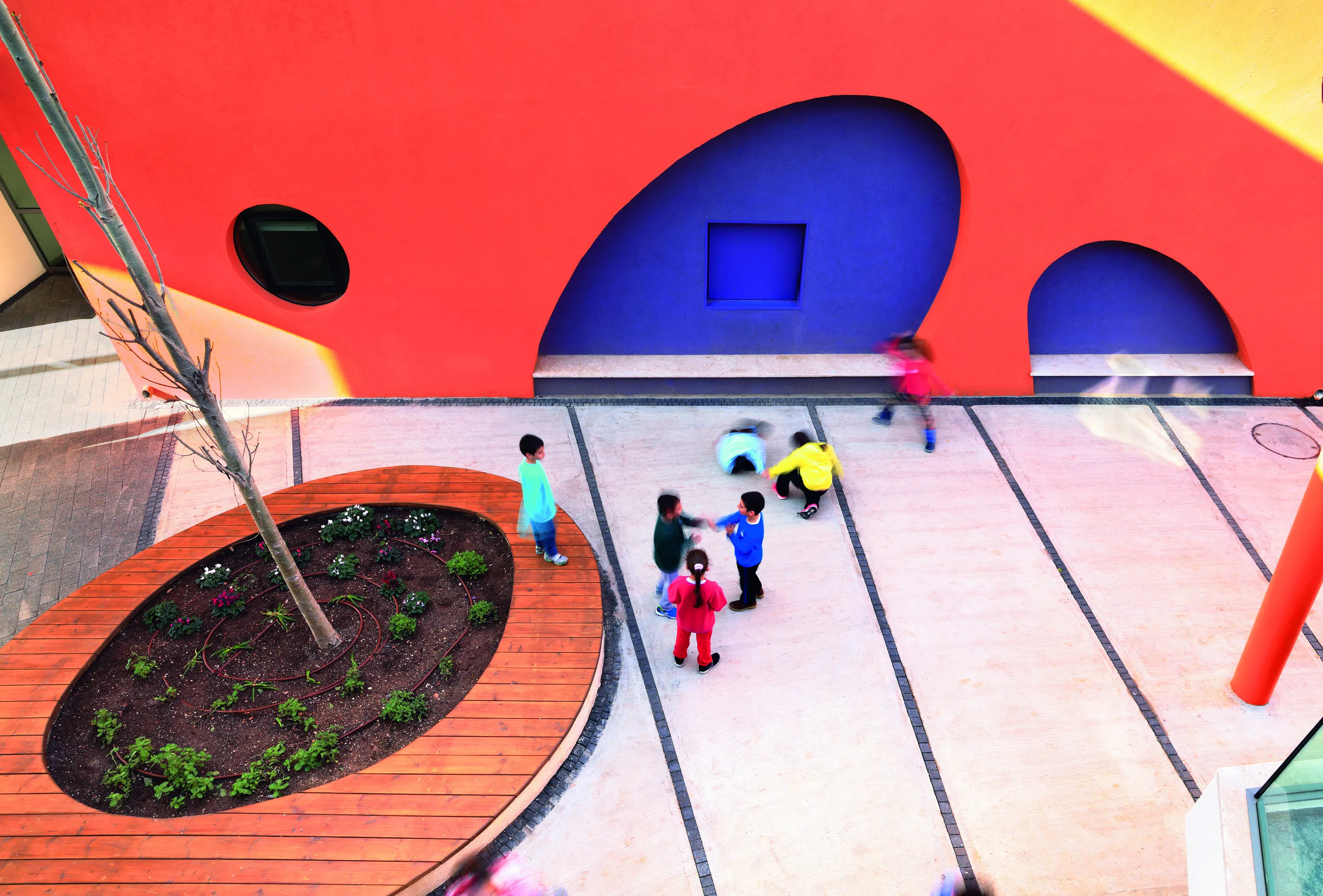
6 形式的呼应Dialogue between forms
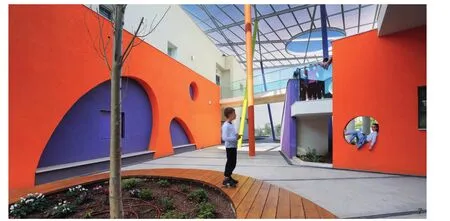
7 多功能树池坐凳The tree multi-functional bench

8多功能操场The multi-functional playground
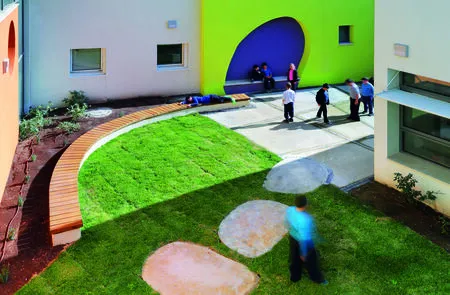
9 图书馆前场地The library court

10 主入口大厅The mail entrance hall
About two weeks after construction was complete on the Rakafot School, for which we were the landscape architects, and the opening of the school year, we received a surprising phone call: “I wanted your opinion on adding frogs to the school’s ‘Winter Pond’.” It was the agriculture teacher, “We received complaints about mosquitos,and it seems to be the right way to stop them is by using frogs. Besides, it will be wonderful to hear their croaks along with the children’s loud and cheerful voices.” “It’s a great idea,” we hastened to assure her, with a fantastic inner feeling, “yes, that works.”
The platform we designed for the school’s faculty and student body to sense, observe, discover and learn about the environment facilitates, the creation of a rich and changing ecosystem.
The “pond” is a depression which gathers the runoff from its immediate environs after the plentiful f i rst rains about the time of the beginning of the school year. The pool filled up with water and a variety of f l ora and fauna. Besides the water acting as a decorative element in the landscape, the reservoir presents a practical lesson in collecting runoff water for irrigation and gardening as well as an opportunity to observe the wide variety of life forms which enjoy the rich habitat.

11 绿色农业屋顶The green agricultural roof
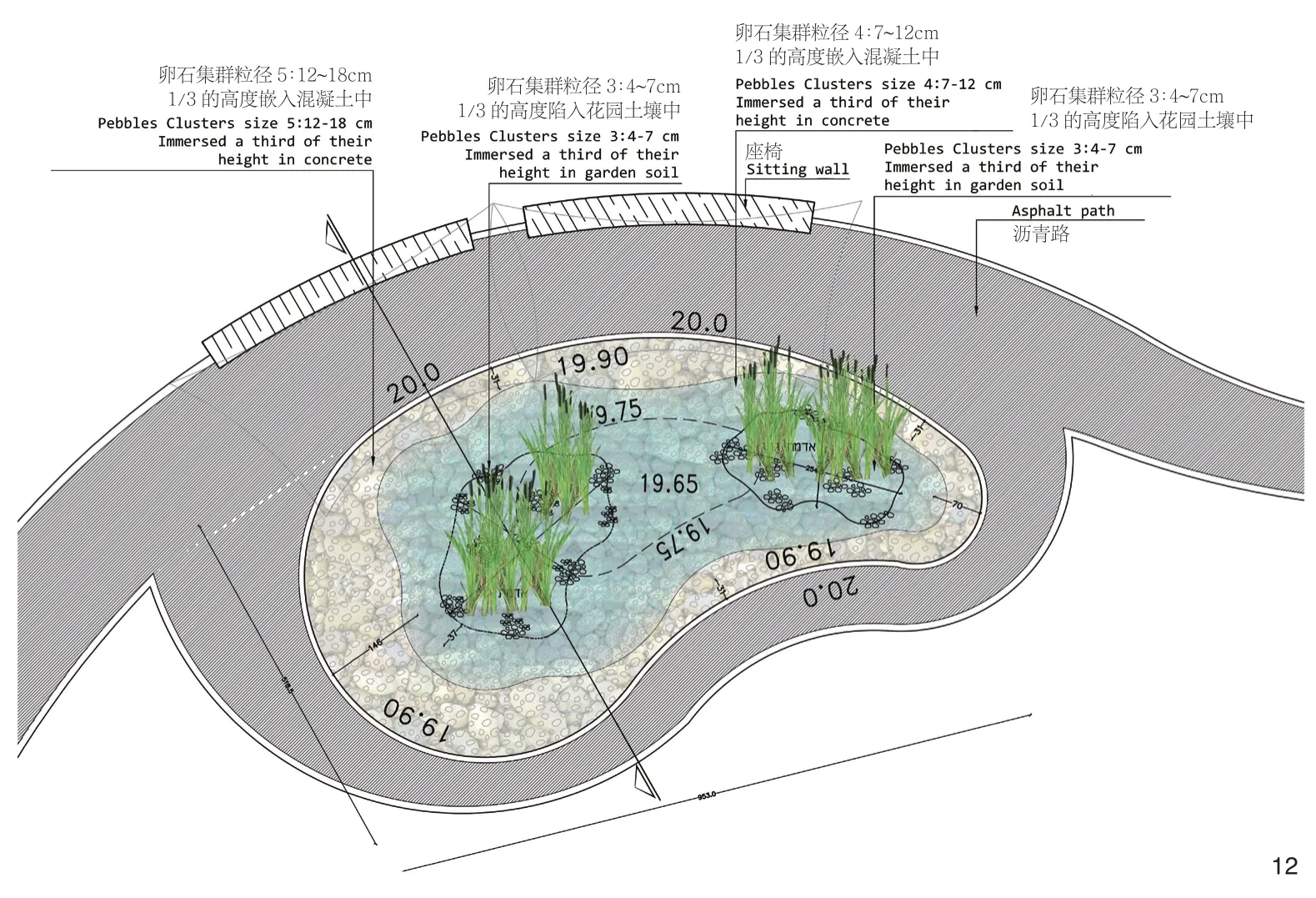
12 冬日池塘平面图Winter pond plan
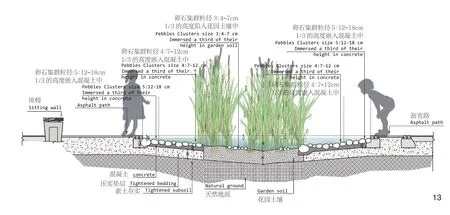
13 冬日池塘剖面详图Winter pond section detail
The “winter pond” is just one example of integrating the principles of green construction in designing the schoolyard of Kiryat Bialik’s Rakafot Elementary School. The elementary school, with its 18 classrooms, is a pilot project of Israel’s Ministry of the Environment, in advance of future construction of similar ecology-oriented schools.The extra added values accruing to this kind of school are manifold, including environmental awareness and preservation of the environment,efficient use of resources, optimum learning conditions and environmental education.
Additional principles of green construction were assimilated into the planning of the grounds by creating areas where the rainwater could inf i ltrate the soil, and designing areas shaded with pergolas and local water efficient plantings. To restore local f l ora and fauna to the school grounds,we created varied habitats, such as the butterfly garden at the main entrance, where we planted species of plants forming habitats for varieties of local butterf l ies.
Sections of the main school pathway and the parking area were paved with recycled stone tiles to form the main space, on both sides of which stand the separate school structures: the classrooms building, library, administration module and gymnasium. This main pathway links the divisions of the school. All along its length, we planted poplars, which will soon grow up into the openings in the pergolas providing shade above the pathway.
Some of the principles of conservation of resources used in green construction will be implemented through the use of green roofs,which provide excellent insulation while preventing refraction of sunlight, as well as embodying a visually-interesting learning space. Thus the green roof helps assimilate the environmental values through having the students care daily for the plantings and maintain the herbs and spices in the roof garden.
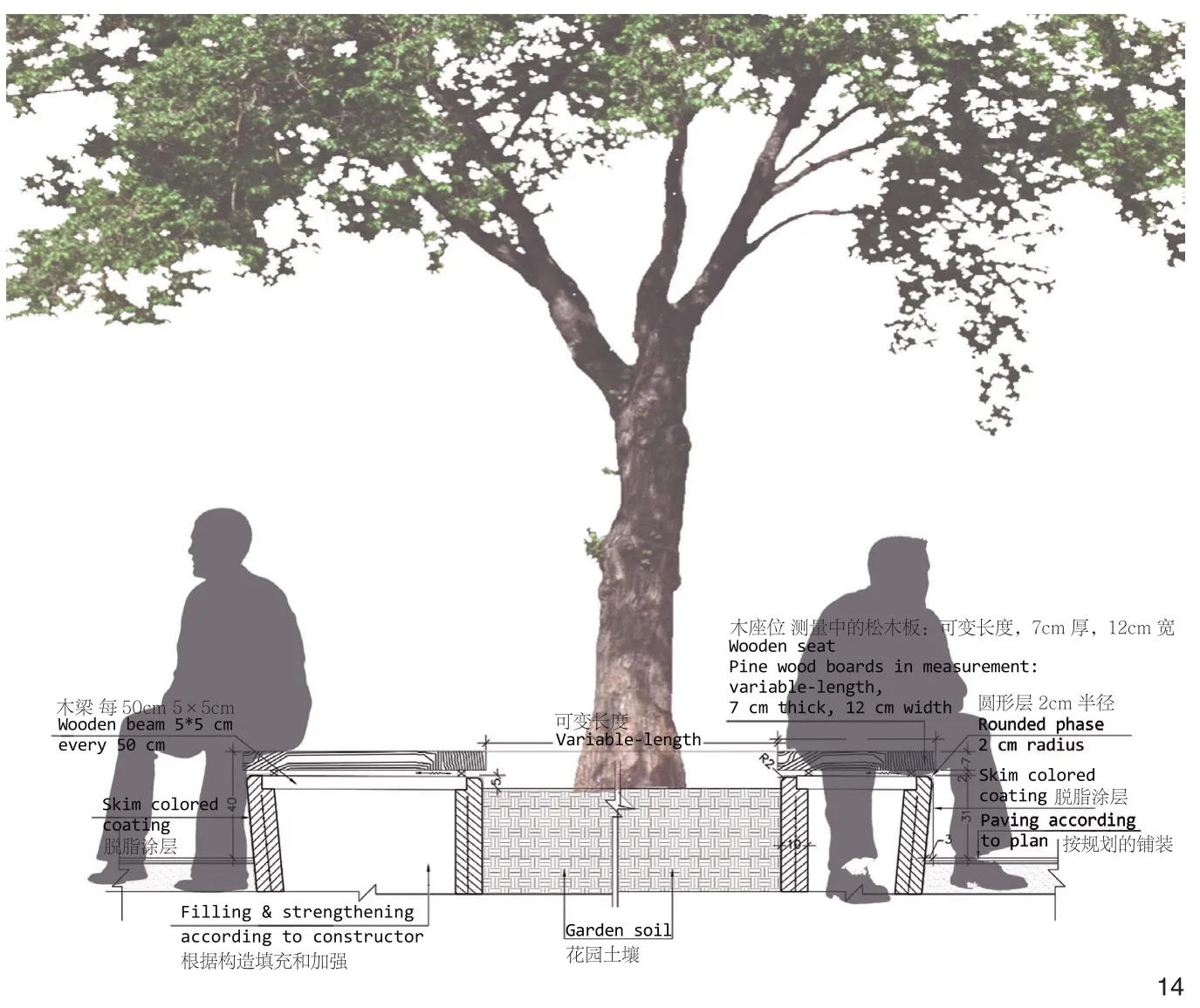
14 圆凳The round bench
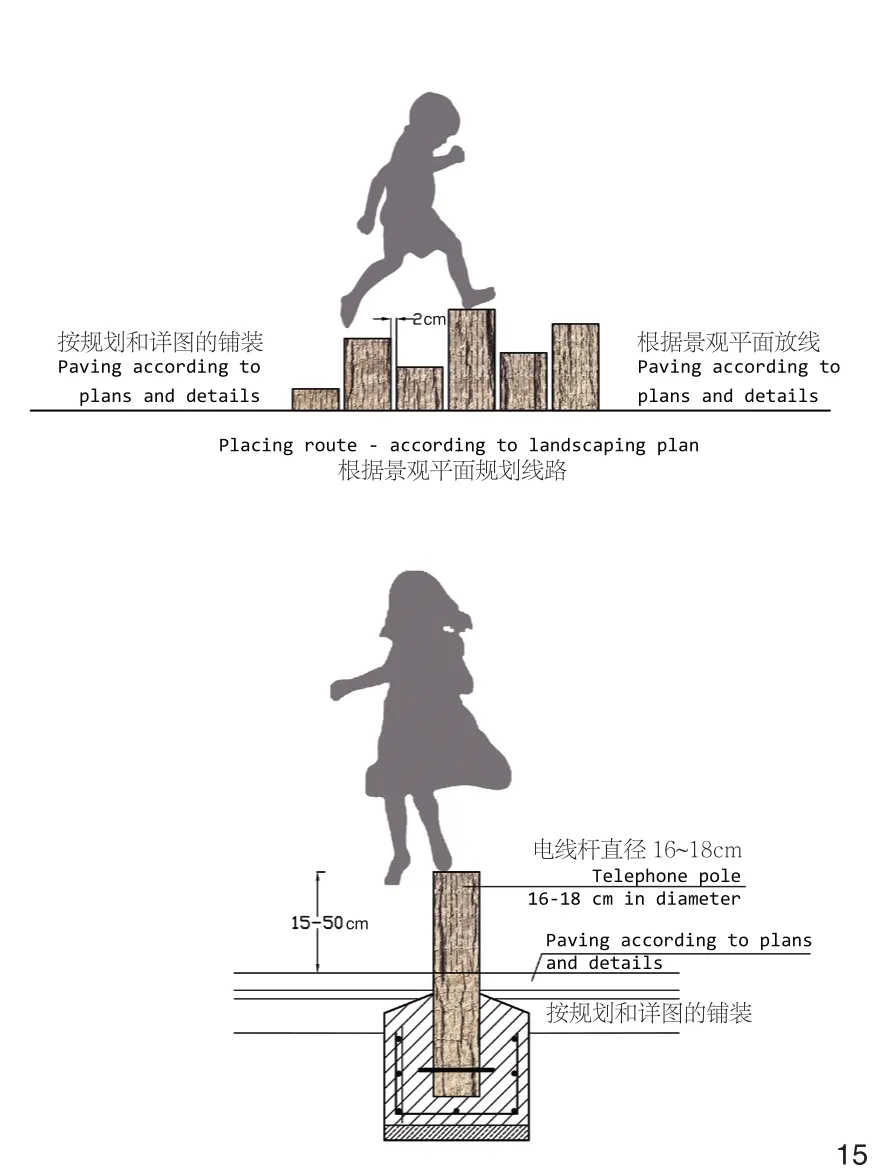
15 木质阶梯剖面详图The stepping logs detail
We designed what we call the “adventure path” to provide a sense of adventure and replace the central pathway. Although it twines around the various buildings and the yard area, it is narrow,winding, and much more intriguing than the wider central pathway. It is made of asphalt, not stone,beginning from the parking lot and passing over grassy hills and vegetation which blur the school’s borderlines to create an interesting three-dimensional space. The path goes through the play spaces decorated with circles used for all types of games.In practice, we consider the pathway itself to be an extremely meaningful play environment facilitating movement and challenging the imagination.
In designing the open space, we strove to correspond with the architecture of the school buildings, with their diagonals, areas skipping over the space, and the circle patterns in the playground.The straight rows of the plantings and the elliptical platforms are complementary to the lines characterizing the school structures. The integration of the architecture and the surrounding landscape created a single, holistic environment.
Along with the integration of green principles,what we consider of utmost importance for school grounds is to envision the school grounds as a space complementing the classroom areas on many levels. The school grounds must be a f l exible zone enabling play, movement, running and jumping. It is a changing space with soft forms, and should be as close to nature as possible. Although the open space can be considered a learning space, we see it primarily as a refuge from the classroom, a place in which to observe study closely and, with a little luck, discover little tadpoles which began a new generation of frogs.
Developer: Kiryat Bialik Municipality, Engineering Head Department
Architect: Knafo Klimor Architects
Landscape Architecture: BO-Landscape Architects
Structural Engineer: Remix-Consultants, Planning &Engineering
Electrical Engineer: Tel-Electric Engineering
Green Construction: AES-Advanced Energy Systems
Service Engineer: AES-Advanced Energy Systems
Water & Drainage: S. Agnon and Partners
Safety consultant: Naftaly Ronen Architects
Roads Design & Planning: Zvika Nave
Development contractor: Hisham Khmeisi, Hisham Group
Project management & supervision: Nativ Engineering &Management Ltd.
Size: 12,000 m2
Location: Kiryat Bialik, Israel
Year of completion: 2014
Photography Credits: Fig.1,12~15©BO-Landscape Architects; Fig. 2~11©Amit Haas
Translator: SUN Xue-rong
Proofreader: SUN Yue, WEI Dan-ning
